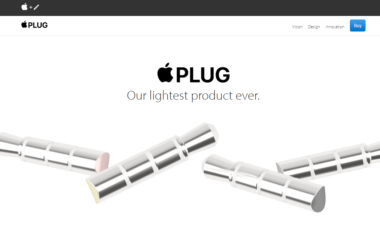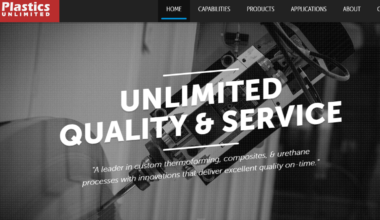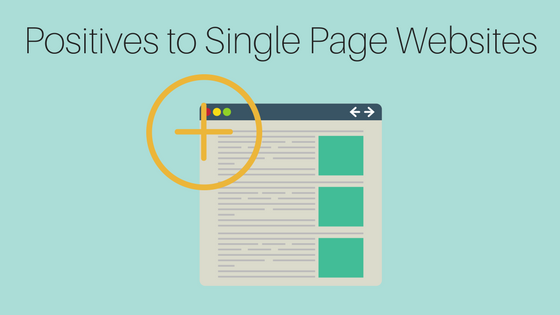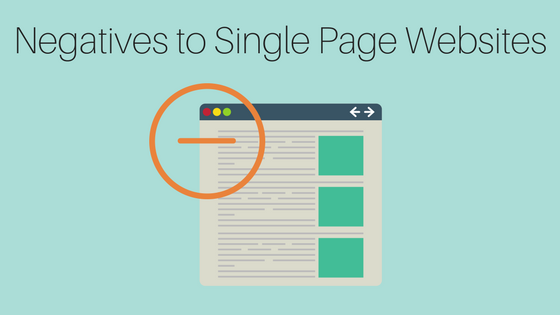Single page websites are extremely popular right now. More and more companies are choosing them over elaborate multi-page sites to meet the needs of their businesses. But does the design of your website impact your SEO? Could a single page site actually hurt your chances of ranking with Google? Below, we’ve explored some of the pros and cons of single page sites and how the simple format could potentially impact your SEO.
If you are unfamiliar with single page websites there are many websites that will showcase them. Here are a few examples:
Single Page Sites Typically Provide a Better Mobile Experience
It’s no secret that the majority of people performing web searches are doing it from a mobile device, which is one of the advantages to having a single page website. Single page sites typically convert much easier to mobile, and users find them simple to navigate.
They also load much faster than multi-page sites, which is a huge bonus for most users who don’t have the patience to wait longer than a few seconds for a site to load. In addition, some people find it difficult to click on additional pages or tabs on a small device, such as a smartphone, and so having a single page site is a blessing for those with not-so-thin fingers.
Single Page Sites Make It Easy to Target a Specific Audience
Single page websites are great for those looking to target a specific audience and provide them a certain type of user experience. It’s easy to control their behavior on your site and steer them in a specific direction if you don’t have to worry about them clicking on various pages, possibly in the wrong order.
With a single page site, all the information you want users to access can be presented to them on one page, in whatever order you choose to suit the needs of your business. In SEO terms, this can be important if there is only one keyword or set of keywords you’re worried about targeting.
You’ll want to keep in mind though that because users have to scroll through everything in order to find what they’re looking for, they could easily get turned off if presented with information they don’t find valuable. Make sure everything you put on your site has a purpose and that you’ve put some thought into its placement. It defeats the point of a single page site if you ruin the simplicity with haphazard photos and posts that confuse your audience.
Single Page Websites Can Provide Higher Page Authority
Links are one of the largest factors that determine how well a website ranks and the benefit that a single page website has going for it is that every link acquired will point to the main URL so there will always be a 1:1 ratio of links to pages.
Single Page Sites Don’t Allow for Wide Keyword Targeting
Unfortunately, there are some SEO drawbacks to single page sites — keyword rankings being one of them. Single page sites are generally supposed to be designed around one main concept, which limits your ability to rank for a wide variety of keywords.
One of the benefits a multi-page site has is that every page on their website is a new opportunity to position (rank) themselves to target an audience specific to that page’s theme. This may end up being the deciding factor for some business owners.
If you depend heavily on Google to find new customers, then you might be better off creating a multi-page site that incorporates different keywords into each page to attract a wider audience. But if Google search isn’t a main priority for your company, the lack of keyword ranking shouldn’t pose a problem.
The Content on Single Page Sites Lacks Detail
Another downfall to single page sites is that the content published on them is generally not as specific as what is published on multi-page sites. You don’t have the luxury of devoting a separate page for each topic you want to cover; instead, all your information needs to be presented on one page. This is why organization and layout are key elements to pay attention to when designing your page.
But even if your layout is exceptional, visitors still might end up disappointed with the lack of relevant content. It’s virtually impossible to cover the same amount of information on one page as it is on multiple pages. This poses a problem for visitors who are looking for detailed, relevant content on specific topics.
One thing you can do, however, is define sections for content on your single page site. Create a new section for each new topic as if it were a separate page. For some businesses, this will be enough to satisfy their customers and their SEO won’t suffer from a high bounce rate.
Single Page Sites Don’t Allow for Some Advanced SEO Strategies
There are certain SEO strategies and best practices that simply won’t work on a single page site. One such strategy is called “siloing.” Siloing is “the practice of structuring your website into main areas of interest for the purpose of demonstrating authority in these areas.” In simple terms, siloing is a way to organize your website into categories and subcategories in order to best display your content.
Those who excel at siloing will take a main topic and break it down into so many subtopics that they end up covering each subject in extreme detail, thus answering the majority of questions posed by their visitors and optimizing their SEO by ranking well on a multitude of different keywords and subjects.
This simply isn’t possible to do well on a single page site. It will come out a disorganized mess if you try to cram a ton of specific details on many different topics all onto one page. The multi-page design is a much better organizational layout for siloing.
The Takeaway
Personally, I would say that single page websites are not as good for SEO as multi-page websites. But then again those interested in single page websites probably aren’t as interested in SEO in the first place.
When determining whether your site should be single or multi-page, you need to consider the goals for your business and what you’re trying to accomplish with your website.
You should also take into account your customers and target audience, and decide which site will best provide them with a satisfying web experience.
Do you currently have a single or multi-page site for your company? Do you believe the design of your web page has impacted your SEO? Let’s continue the discussion on social media!
Image Credits
Featured image: trueffelpix/DepositPhotos
Other images and screenshots created by author.
ADVERTISEMENT
Go to Source
Author: Adam Heitzman
The post Single Page Websites: Are They Good or Bad for SEO? by @AdamHeitzman appeared first on On Page SEO Checker.
source http://www.onpageseochecker.com/single-page-websites-are-they-good-or-bad-for-seo-by-adamheitzman/





No comments:
Post a Comment